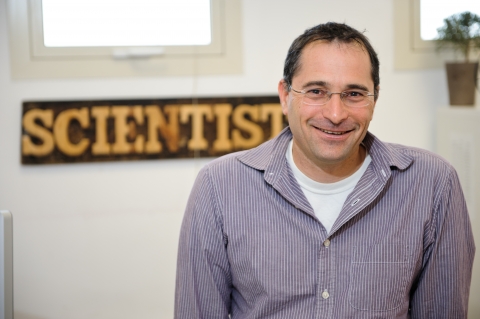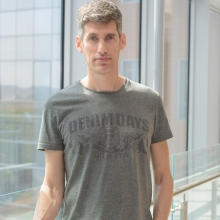Why COVID-19 kills, or doesn’t
Weizmann technology maps the difference between coronavirus patients
Briefs

Most people who are infected by COVID-19 develop mild symptoms or none at all. In severe cases, however, the virus triggers an uncontrolled reaction of the immune system that damages most vital organs, and can lead to death. In recent research, Prof. Ido Amit from the Weizmann Institute of Science determined what differentiates COVID-19 progress in seriously ill patients, as opposed to those who are only mildly affected.
His discoveries, published in the prestigious journal Cell may pave the way for new and personalized treatments that would prevent or significantly curtail the impact of the disease.
Prof. Amit, of the Department of Immunology, studies the genomic code that controls how cells of the immune system differentiate into specific subtypes, and how these various cell populations respond to invading pathogens. This complex dynamic is central to understanding COVID-19; current research indicates that many coronavirus fatalities result from over-activation of the immune system. This phenomenon, called a “cytokine storm”, could hold the key to preventing the virus’s deadly effects.
What happens in the lungs of a hard-hit patient
To determine what happens in seriously ill coronavirus patients, Prof. Amit used an original technology for single-cell genomic analysis developed in his lab. Designed to systematically scan for viral RNA—the genetic information inserted into a host cell during the process of infection—this tool enables precise, global mapping of the genes and communication pathways activated in infected cells. This dynamically changing data can be tracked over time, making it possible to compare overall cellular activity as it plays out in severely and lightly affected individuals.
The Amit lab discovered that the COVID-19 infection causes macrophages—cells that normally assist in ridding the lungs of infection, viruses and microbes—to be replaced by cells that actually exacerbate the illness. They also discovered that, in seriously ill patients, the immune system’s T-cells are neutralized, thereby allowing other viruses, already present in the body, to inflict damage.
This study, performed together with Prof. Amit’s colleagues in China and France, establishes the new methodology as a broadly applicable tool for dissecting mechanisms of viral infections, something that could lead to both improved testing, and more effective personalized treatments. The game-changing approach is being calibrated now in the hopes that it will soon be available for widespread use.
Prof. Ido Amit is supported by the Helen and Martin Kimmel Award for Innovative Investigation, the Sagol Institute for Longevity Research, the Kekst Family Institute for Medical Genetics, the Thompson Family Foundation Alzheimer's Research Fund, Foundation Adelis, the Steven B. Rubenstein Research Fund for Leukemia and Other Blood Disorders, the Garvan Weizmann Partnership, Rising Tide Foundation, Anita James Rosen Foundation, Wolfson Family Charitable Trust, Estate of Simon Saretzky, and the Estate of Arthur Rath. He is the incumbent of the Eden and Steven Romick Professorial Chair.

Prof. Ido Amit








